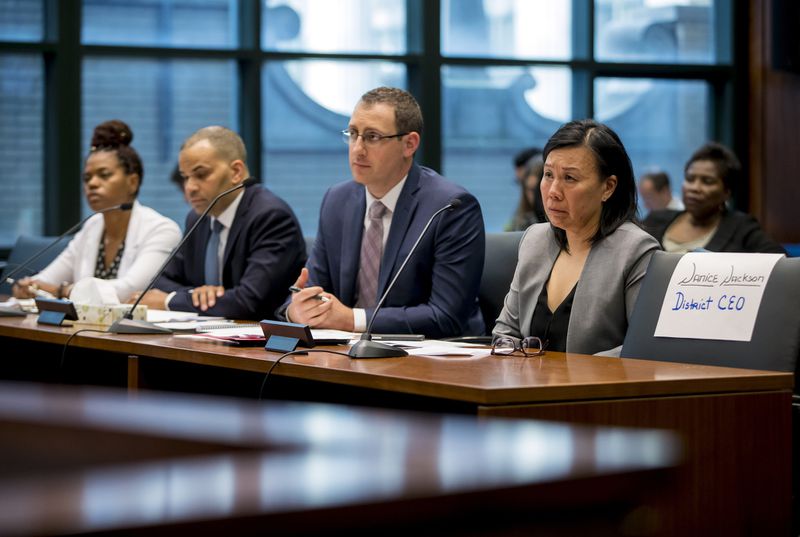Cps and Sex Abuse: Lessons from the Catholic Church
By Kristen McQueary
Legislation tightening reporting requirements for school districts implicated in child sex abuse cases is awaiting Gov. J.B. Pritzker’s signature. Following the Tribune’s “Betrayed” series last year, which revealed rampant, hidden sex abuse and assault incidents within Chicago Public Schools, lawmakers passed a bill requiring more reporting and information-sharing for all schools. It’s a solid step forward. But it’s also important to contextualize what led to the changes in state law. Former Mayor Rahm Emanuel and Chicago Public Schools officials for months fought records requests from Tribune reporters on sexual assaults within schools. CPS only relented under threat of a lawsuit. It’s important to remember that the documents City Hall and CPS eventually provided were heavily, ridiculously, redacted. It was not an exercise in protecting students. It was an exercise in CYA. Reporters strung together police records, court files, other public documents and interviews to compile a database of abuse allegations, without the dutiful or transparent assistance of CPS, a taxpayer-funded agency. It is most important to remember the gross, indefensible number of victims: Police investigated 523 reports that children were sexually assaulted or abused inside city public schools from 2008 to 2017, or an average of one report each week. More than 500 cases, shrouded in secrecy. Without the diligence of journalists, those cases might have stayed buried. That’s what City Hall hoped. Instead, the scandal forced a reckoning at CPS more than 25 years after the Archdiocese of Chicago began to acknowledge and take steps to hold priests and other religious personnel accountable for allegations of sexual abuse and assault against children within its schools and institutions. As despicable as the Catholic Church sex abuse scandal has been, the archdiocese here implemented a protocol for dealing with it, and strengthened that protocol repeatedly, beginning in the early 1990s. For more than 15 years, the archdiocese has conducted background checks on priests, staff, volunteers and any parent or coach who might come into contact with a student. The archdiocese has removed, named and outed priests with substantiated allegations of abuse against them, even without a criminal conviction in a court of law. The archdiocese still publishes a list of all priests with substantiated allegations and refers new cases to the local state’s attorney. And although former Illinois Attorney General Lisa Madigan questioned the list of cases disclosed by the six Illinois dioceses, officials within the church — including Cardinal Blase Cupich during a meeting Monday with the Tribune Editorial Board — have questioned how Madigan arrived at her numbers: Although Madigan’s report suggests a higher volume of potential cases, the archdiocesan officials say they had provided records of all of their cases, going back decades. A follow-up report is expected from the attorney general’s office. For years, the archdiocese has required a training course for anyone whose role in a Catholic school or church brings them in contact with kids. That usually means every Catholic school parent, as most schools require parents to volunteer. The training course is a gut-wrenching exercise that includes watching videotaped interviews with convicted child sex abusers who describe how they targeted their victims, how they groomed them and how they committed their crimes. Catholic school kids within the diocese also are taught how to react to inappropriate behavior and how to report it. It is an ongoing, annual, expensive — but necessary — component of the Chicago Archdiocese’s response to the global child abuse scandal. Meanwhile, CPS only recently started mandating comprehensive background checks on teachers and staff, amid some grumbling from Chicago Teachers Union now-President Jesse Sharkey, who has been dispassionate about the scandal. He refused to be interviewed for an inspector general probe that found CPS and its schools, teachers and administrators failed at nearly every level to identify, address, investigate or even acknowledge the extent of the problem. Union leaders always say they’re motivated by pursuing the best interests of kids. They should have been outraged and cooperative from the start in rooting out abusers at CPS. They were not. CPS still has not publicly identified the majority of adults in its system who have been accused of wrongdoing, and the new law awaiting Pritzker’s signature does not require that disclosure, even if an educator gets disciplined by the state. Perhaps a trailer bill in the fall veto session could address that part of the legislation that got dropped. CPS CEO Janice Jackson and CTU officials should be calling for it, if protecting kids is their top priority. Jackson, who is relatively new to the job, is doing a better job than her predecessors in bringing accountability to CPS. But it only happened after CPS and City Hall covered up these cases for decades — and then for months tried to dodge media scrutiny. CPS could learn from the Archdiocese of Chicago. Full transparency and accountability is the only path forward. Kristen McQueary is a member of the Tribune Editorial Board. Contact: kmcqueary@chicagotribune.com
|
.
Any original material on these pages is copyright © BishopAccountability.org 2004. Reproduce freely with attribution.
